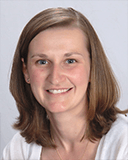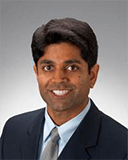The Cleft-Craniofacial Center: Caring for Children with Complex Cleft and Craniofacial Differences with Matthew Ford, MS, CCC-SLP
Matthew Ford, MS, CCC-SLP, clinical coordinator, Cleft-Craniofacial Center, UPMC Children’s Hospital of Pittsburgh, discusses the journey of new parents learning their child will have a cleft or birth anomaly. He describes the breadth of treatment options available for kids with craniofacial differences who remain patients of the center until adulthood.
Meet Our Guest

Matthew Ford
Meet Our Hosts
 Amanda Poholek, PhD, is director of the Health Science Sequencing Core Facility at UPMC Children’s Hospital of Pittsburgh and an assistant professor of Pediatrics and Immunology at the University of Pittsburgh School of Medicine. She earned her bachelor’s degree from Fordham University and her doctorate degree in cell biology from Yale University. She also completed a post-doctoral fellowship at the National Institute of Arthritis and Musculoskeletal and Skin Diseases at the National Institutes of Health. Dr. Poholek’s lab at UPMC Children’s studies immune cells and how transcriptomics and epigenetics contribute to health and disease.
Amanda Poholek, PhD, is director of the Health Science Sequencing Core Facility at UPMC Children’s Hospital of Pittsburgh and an assistant professor of Pediatrics and Immunology at the University of Pittsburgh School of Medicine. She earned her bachelor’s degree from Fordham University and her doctorate degree in cell biology from Yale University. She also completed a post-doctoral fellowship at the National Institute of Arthritis and Musculoskeletal and Skin Diseases at the National Institutes of Health. Dr. Poholek’s lab at UPMC Children’s studies immune cells and how transcriptomics and epigenetics contribute to health and disease.
 Arvind Srinath, MD, MS, is the Pediatric Gastroenterology Fellowship program director at UPMC Children’s Hospital of Pittsburgh and an associate professor of Pediatrics at the University of Pittsburgh School of Medicine. He received his bachelor’s degree from Johns Hopkins University and his medical degree from the University of Pittsburgh School of Medicine before completing a residency at Johns Hopkins Hospital, a fellowship at UPMC Children’s Hospital of Pittsburgh, and a master’s degree in medical education at the University of Pittsburgh School of Medicine. Dr. Srinath’s areas of interest are curricular development, functional gastrointestinal disorders, and telehealth. Find him on Twitter: @Srinath_Arvind.
Arvind Srinath, MD, MS, is the Pediatric Gastroenterology Fellowship program director at UPMC Children’s Hospital of Pittsburgh and an associate professor of Pediatrics at the University of Pittsburgh School of Medicine. He received his bachelor’s degree from Johns Hopkins University and his medical degree from the University of Pittsburgh School of Medicine before completing a residency at Johns Hopkins Hospital, a fellowship at UPMC Children’s Hospital of Pittsburgh, and a master’s degree in medical education at the University of Pittsburgh School of Medicine. Dr. Srinath’s areas of interest are curricular development, functional gastrointestinal disorders, and telehealth. Find him on Twitter: @Srinath_Arvind.
Disclaimer
This podcast is for informational and educational purposes only. It is not medical care or advice. Clinicians should rely on their own medical judgements when advising their patients. Patients in need of medical care should consult their personal care provider.











